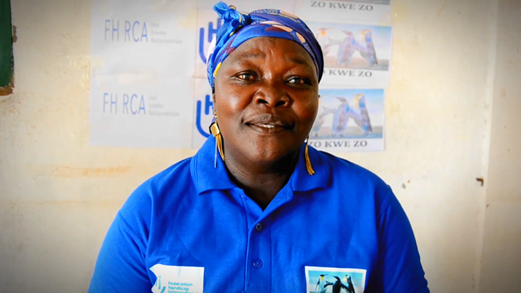Humanitarian Fund helps strengthen local CAR organizations
CAR | 2024 | CBPF
Central African Republic. Asta Fakitoum founded Zo Kwe Zo, an organisation deeply rooted in the Central African Republic (CAR). Meaning “All humans are equal” in Sango, it was initially formed in 2006 to respond to the conflict that devastated the northwest of the country, and help widows, orphans, and other vulnerable people.
Since then Zo Kwe Zo have broadened their activities to address other critical issues affecting the community like explosive device risks, in collaboration with Humanity and Inclusion (HI) and the CAR Humanitarian Fund.
Civilians are the main victims of explosive devices in CAR. More than three-quarters of the casualties of 82 incidents in 2023 were civilians: 27 people, including 19 children. In the first half of 2024, 14 people, including seven civilians, have already been killed in 33 incidents.
The last three years have seen a significant increase compared to 2020, when only two incidents, with no casualties, were registered*. People are severely restricted in their movements in this region where food insecurity remains critical, preventing them from using roads and paths to get to work and to farm produce. Explosive ordinance can also hinder the delivery of humanitarian aid, so training and capacity-building of de-mining organizations is essential.
Ms. Fakitoum and her colleagues recently joined a training series aimed at helping organizations in the region better understand international funding systems and requirements, which also built technical capacity to implement explosive ordinance awareness programmes in CAR.
From CAR, the Association of Women for Entrepreneurship (AFPE) and Zo Kwe Zo both took part to strengthen their technical know-how. They asked HI to be their partner.
“Humanity and Inclusion is the only actor implementing an Explosive Remnants of War Risk Education – or EREE – response. We were approached by Zo Kwe Zo and AFPE to support them in this field due to the resurgence of explosive devices,” said M. De Gaillande, HI project director. “It is very rare to find funding opportunities to support this type of mentorship,” he added. “This funding from the CAR Humanitarian Fund truly advances localization.”
With the support of HI support, the two organizations obtained UNMAS accreditation and have so far conducted awareness and safety campaigns for 10,000 people. It is the first time in CAR that UNMAS has accredited two national organizations to conduct risk education activities on explosive devices.
The training also helped the local organizations understand ways of seeking international funding. “We feel capable of managing larger funding envelopes, pursuing mine risk education programming, and extending and deepening our work in the community,” explained Ms. Fakitoum.
For more information on the CAR Humanitarian Fund and for real-time contribution and allocation data go to the Pooled Funds Data Hub.
